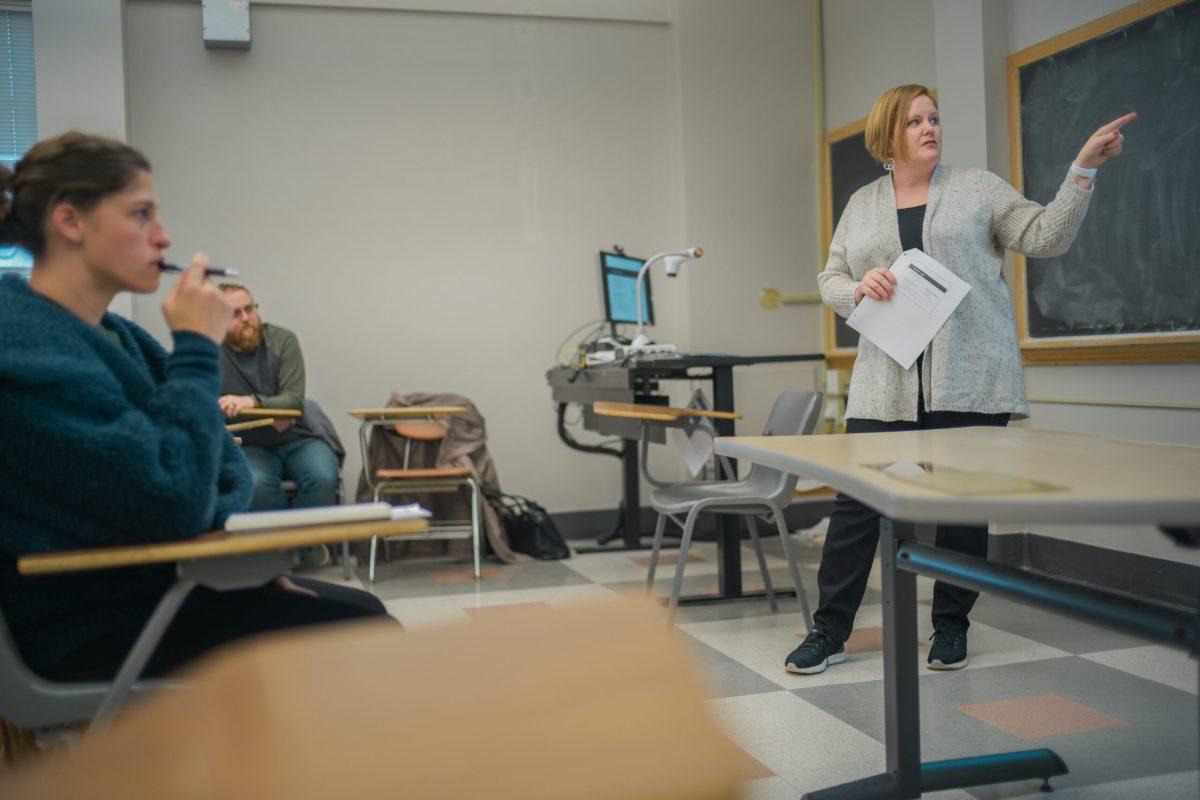Often times, due to popular media, body image can be distorted and turned into an impractical view of one’s self worth, functionality and capability. Ginny Ramseyer Winter, Ph.D., assistant professor in the MU School of Social Work and founding director of the Center for Body Image Research & Policy, conducted research on body image and recognized the influence it has on society, especially on women.
“We’re socialized that appearance matters in terms of your value as a human being, girls especially,” Ramseyer Winter said. “Girls are sexually objectified and taught that this is what matters for them as a person. And so, when we can’t measure up to that, this ideal that is not possible for most people results in shame, which can transform into poor mental health.”
Ramseyer Winter received her undergraduate degree at the University of Kansas, immediately starting her master’s afterwards at the University of Michigan. After gaining a master’s degree in social work, she worked for the state of Kansas doing public health education around food safety. Then, Ramseyer Winter moved on to doing volunteer coordination for the nonprofit organization KC Care, which is the leading provider of HIV care in Kansas City.
“I had some of the best sex educators in the country,” Ramseyer Winter said. “I learned so much from them about how to do community education, how to meet students with different learning styles in a classroom setting, how to manage classrooms. I’d say a lot of my pedagogical training comes from them.”
Wanting to focus on research, Ramseyer Winter eventually decided to go back to the University of Kansas to receive her Ph.D., and afterwards came to the University of Missouri to teach and begin research on body image.
“I think it’s crucial to shift this focus away from appearance, more toward function, appreciating our bodies for what they do for us,” Ramseyer Winter said. “We use them to carry our children, to get from place to place, to do the things that we love.”
Mackenzie Cook, Ramseyer Winter’s graduate research assistant, has had the opportunity to see how Ramseyer Winter teaches first hand, and has directly benefited from her advice and guidance.
“She’s really been an awesome advocate for me and wanting to make my courses fit my personal and research agenda.” Cook said. “I received a national grant for a teen pregnancy study and if it wasn’t for me being able to move my schedule around and focus my time on that I don’t know how I would be able to do it.”
When people are engulfed in their appearance, important tasks like thriving in a career, focusing on education and eventually taking care of a family can be nearly impossible and lead to dangerous eating disorders, from using obsessive coping mechanisms to deal with anxiety.
“Eating disorders are the most deadly mental health issue or mental illness,” Ramseyer Winter said. “And, that said, they’re also very treatable. There’s no access to eating disorder treatment in Central Missouri, you have to go to Kansas City or St. Louis. I work with the Missouri Eating Disorders Council, and we’re training providers to try and create more treatment teams that are trained.”
Ramseyer Winter has also been exploring secondary sex education, in collaboration with Ph.D. Fang Wang, professor of Electrical Engineering and Computer Science in the College of Engineering. Ramseyer Winter sees the possibilities of incorporating virtual reality technology into sex education.
“Think about going inside of the body and getting to actually see what is going on in your reproductive cells,” Ramseyer Winter said. “The path that the sperm takes, and different male anatomy, visualizing that just adds another dimension, and engages youth in a different way…If you think about actually practicing putting on a condom on a model with VR goggles on. It’s kind of a private moment, so why shouldn’t practicing be more of a private moment, rather than asking students to do that in front of a big group of kids.”
The possibilities of VR technology with sex education is something that has not substantially been explored, and could potentially help with decreasing rape statistics by showing students how to practice healthy refusal skills.
“Using avatars through VR technology to practice refusal skills to say no, or communicate what you’re willing to do with your partner and what you’re not,” Ramseyer Winter said. “Or practice having conversation negotiating condom use.”
Parents may not be comfortable letting their children be exposed to certain topics. There is the potential of some community backlash to the innovative teaching style, but backlash is to be expected with any sex education, according to Ramseyer Winter.
“It might not be a good fit for all communities to use VR technology to do condom demos, but practicing refusal skills would be appropriate,” Ramseyer Winter said. “I obviously think that comprehensive sex ed is important, and that includes teaching about condoms and abortions, but that’s obviously not the cultural norm for all communities. So I think it can be used for things that would be very acceptable to most parents.”
At MU, Ramseyer Winter’s dedication and wholeheartedness has been regarded by not only her students in the classroom, but the students that will soon follow her footsteps. Derek Landes, who undertook his master of social work this year, has ascertained how Ramseyer Winter’s teaching has paid off.
“I really appreciate her honesty and her commitment to the students,” Landes said. “To her what’s most important is what’s best for the kid in the classroom, and it’s disappointing when you don’t see that in teachers. Her research is clearly very important, but when it comes to the classroom the students are first and I respect that a lot.”
_Edited by Janae McKenzie│[email protected]_








